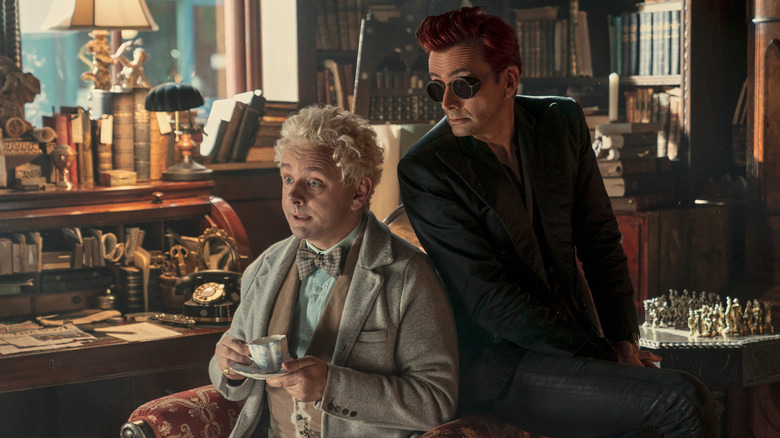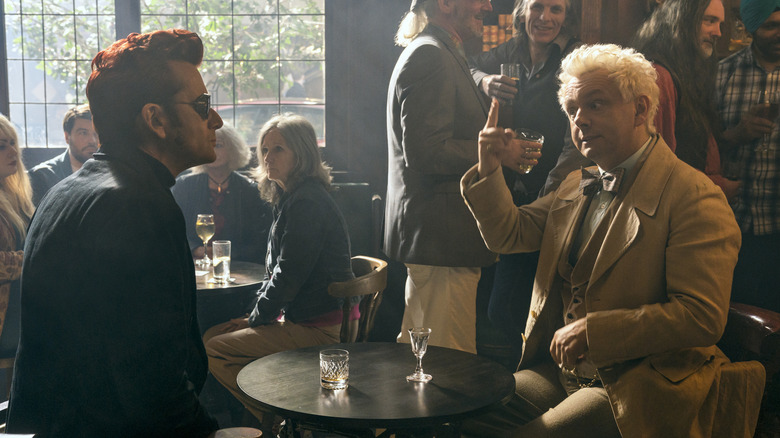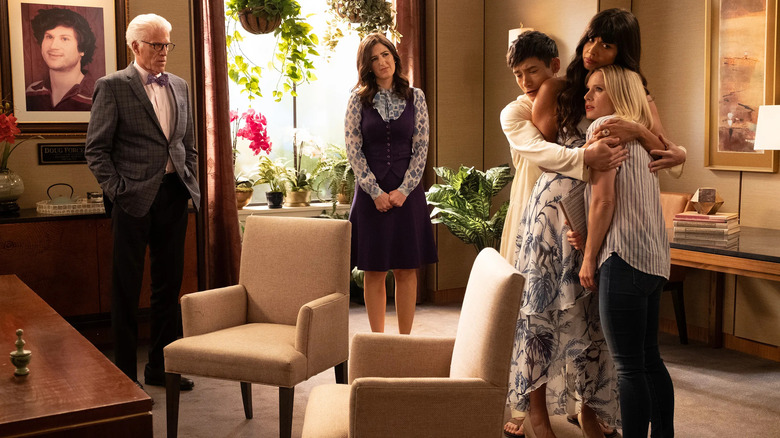Neil Gaiman Has Good Omens Season 3 All Planned Out, But Will That Be The End?
Considering the four year gap between seasons 1 and 2 of "Good Omens," it's easy to see why some fans are frustrated by the season 2 finale. After two seasons of slowly building up to a romance between its two leads, "Chapter 6: Every Day" chooses to split them apart, seemingly for good. Aziraphale (Michael Sheen) decides to take up the fancy new job as Archangel, and Crowley (David Tennant) refuses to go with him and reclaim his old status as an angel. It's a dark end to a season that otherwise seemed to be building up to a happy finale.
Luckily, Neil Gaiman and the other writers involved already have plans for a third season, one that'll presumably bring our two favorite supernatural beings back together. "Season 3 is all planned and plotted and, if I get to make it, will take the story to a satisfying end. If I wasn't on strike I'd be writing it currently," Neil Gaiman explained on his Tumblr page. He added: "Our set is still standing in a studio in Bathgate and we would all love to get back there and finish the story in the way Terry and I plotted, long ago."
A final season decades in the making
Although we don't know much about the expected third season yet, Gaiman's explained that it's based on the actual novel he and the late Terry Pratchett had been plotting out as far back as 1989. Although you'd probably expect season 2 to be the adaptation of the undrafted sequel, it's instead a bridge season, intended to fill in the gap between the first "Good Omens" book and the planned second one.
It's clear even without Gaiman's confirmations that a lot of these first two seasons were written with that second novel in mind. For one thing, the angels and demons outside of our two leads have gotten way more focus than they received in the books. It makes sense as a way to ease us into the adaptation of book two, which would've significantly included them. With season 2's tease of "The Second Coming," it seems likely that season 3 will be the most angel-heavy period of the show so far, a fitting choice for a grand finale.
Of course, season 3 is not a guarantee. Not only is there no end to the writer's strike in sight, but it's still not clear if the show will be renewed even when the strike ends. As Gaiman put it, "It won't be confirmed unless enough people watch season 2 to make Amazon happy." But assuming season 3 does happen, it's still a little bittersweet: Gaiman's said it'll bring the story to an end, and do we really want that? Wouldn't it be nicer if the show could go on indefinitely?
Not the first show to end early
Although there have been plenty of TV shows that long overstayed their welcome, it's also become increasingly common for shows to end surprisingly early on their own terms. Shows like "Succession," "Barry," "The Leftovers," and "Ted Lasso," have all chosen to reject the 8+ season route despite most of them being popular enough to get away with it.
Maybe the most relevant example here is "The Good Place," another charming comedy series with lots of angels, demons, and whimsical explorations of what it means to be a "good" or "bad" person. Neil Gaiman's portrayal of most of his angels — as people far too removed from humans' daily lives to make any good decisions on their behalf — isn't that different from how "The Good Place" depicts Maya Rudolph's Judge Gen, who is so powerful and otherworldly that she can comfortably damn most of humanity to hell without losing any sleep over it. Both series also ironically portray their demon characters as the more down-to-earth team in the battle for humanity's soul.
"The Good Place" made the surprising choice to end after just season 4. Not only did they end the show, but they chose to give most of their characters definitive conclusions, ensuring that audiences will never be able to return to characters like Eleanor, Chidi, or Jason ever again. "At the end of the day, we don't want to tread water just because the water is so warm and pleasant," showrunner Michael Schur explained. It's a thought process Neil Gaiman can probably get behind.
Why three seasons is enough
In the end, it's fitting that a show based on Neil Gaiman and Terry Pratchett's book wouldn't want to go on indefinitely, as both writers have constantly written about the inevitability of endings and how they're not necessarily a bad thing. "All Bette's stories have happy endings. That's because she knows where to stop," Gaiman wrote in the first volume of his Sandman comic series. "She's realized the real problem with stories — if you keep them going long enough, they always end in death."
"Good Omens" deals with a similar problem: Aziraphale and Crowley getting together would please a lot of fans, but it would only count as a happily ever after if the story stopped right there. Although these two immortal beings might not die, any sort of happiness between them surely can't last forever. After all, an eternity together is a long time for the two to grow sick of each other. Not to mention that the will-they/won't-they nature of their relationship is the show's main driving tension; once it's resolved, it's not clear where the show could go from there. Three seasons might still seem too short for many viewers, but allowing "Good Omens" to end on a high note is probably for the best.



